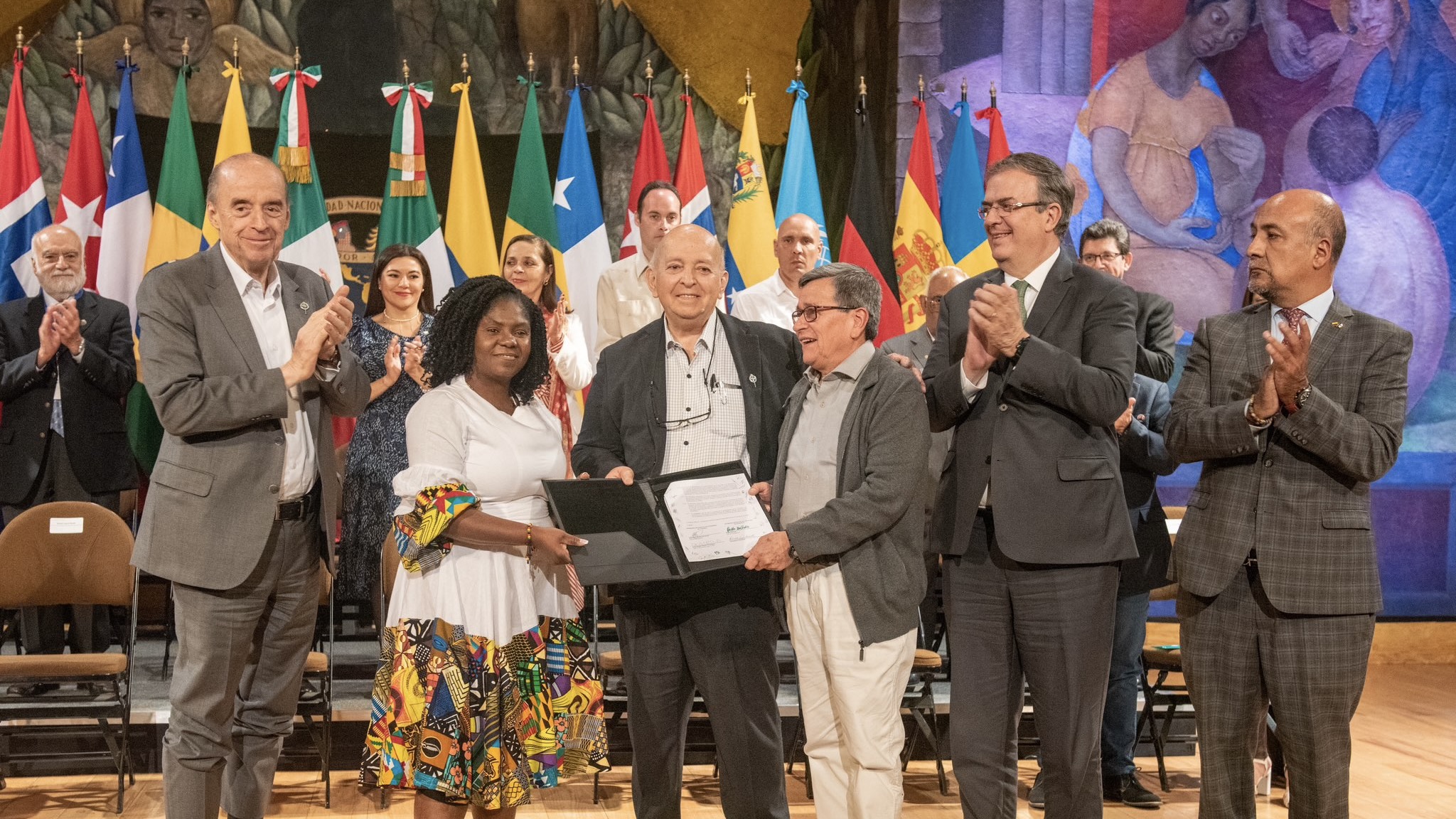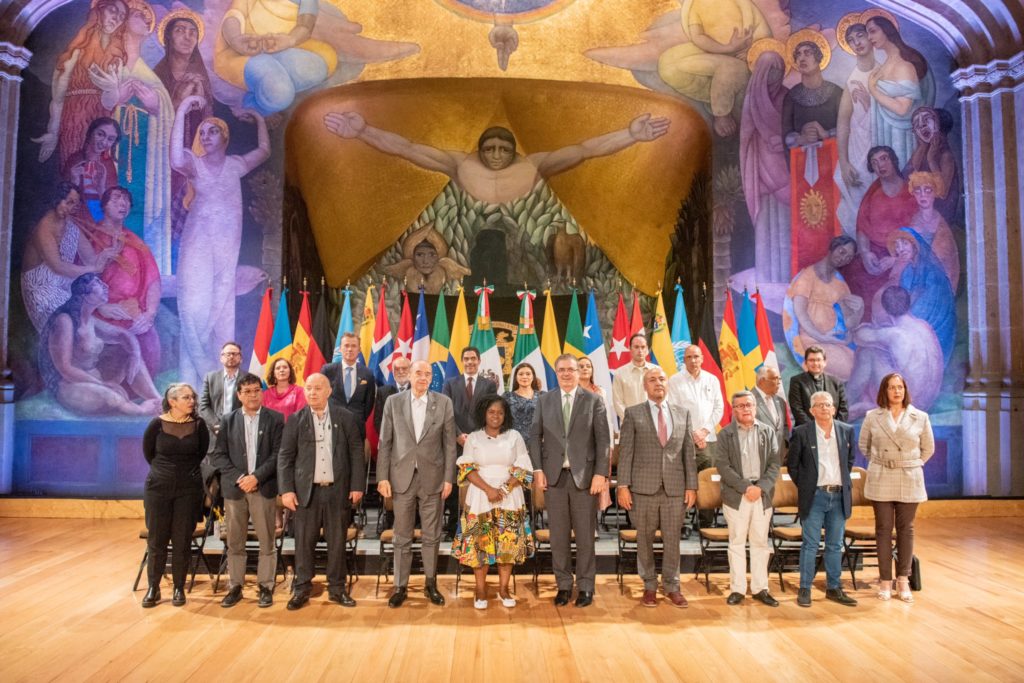Peoples Dispatch
 The Colombian government and the National Liberation Army (ELN) concluded the second round of peace talks on March 10, in Mexico. Photo: Francia Márquez/Twitter
The Colombian government and the National Liberation Army (ELN) concluded the second round of peace talks on March 10, in Mexico. Photo: Francia Márquez/Twitter
During the second round of peace talks, the Colombian government and the ELN agreed on a six-point definitive agenda that will guide the following stages of the negotiation process
The Colombian government and the leftist guerrilla group, the National Liberation Army (ELN), concluded the second round of peace talks on March 10, in Mexico City, Mexico. The delegations of both parties said that they had agreed on a definitive agenda that will guide the following stages of the negotiation process to achieve true and lasting peace in the country. The delegations also noted that they had reached an initial agreement regarding the participation of civil society groups in the process, as well as for a bilateral ceasefire.
“We were able to begin to address the most urgent, heartfelt and sensitive issues, such as the ceasefire, and we also opened the doors wide to citizen and community participation,” said Otty Patiño, the head of the Colombian government delegation.
For his part, Pablo Beltrán, the head of the ELN delegation, said that “The first steps have been taken to achieve a bilateral, national and temporary ceasefire,” adding: “we all have to change to achieve a comprehensive and lasting peace, we all have to participate in its design and realization.”
The definitive agenda, also called the ‘Mexico Agreement,’ was signed by Patiño and Beltrán. The agreement includes six points, which detail aspects such as participation of society in the construction of peace, democracy for peace, transformations for peace, victims, the end of the armed conflict, and the general plan of the execution of the agreements between the Colombian government and the ELN.
Peace negotiations with the ELN began in February 2017 during the government of former President Juan Manuel Santos, but were suspended by his successor Iván Duque in January 2019. After taking office in August 2022, President Gustavo Petro began promoting peace negotiations with different irregular groups and announced the resumption of talks with the ELN.
The first round of talks was held in Caracas, Venezuela, one of the guarantor nations along with Norway, Cuba, Mexico, Chile, and Brazil, between November 21 and December 12, 2022. During the first round, the government and the ELN reached agreements on the safe return of the Embera Indigenous people to their lands in Murindó municipality in the Antioquia department. The community had been displaced due to violence and internal conflict between the Colombian armed forces and ELN combatants. Both sides also reached an agreement for humanitarian relief measures in Bajo Calima in the Valle del Cauca department, and Medio San Juan in the Chocó department.
The second round began on February 13, in Mexico City. On March 8, through a joint communiqué, both parties announced that the third round would take place in Cuba, presumably in May. The delegations expressed their gratitude to the Cuban government and people for the unconditional willingness and fundamental support provided to the peace-building efforts in Colombia. Both parties also rejected the unjust inclusion of Cuba in the list of state sponsors of terrorism by the US, and called for its removal from the list, stating that Colombia recognizes and values Cuba’s sacrifice.
Colombian Vice President Francia Márquez, who participated in the closing ceremony of the second round in Mexico, also highlighted the importance of Cuba’s support. Márquez stressed that six decades of internal armed conflict had been destructive for the people and there was no other way than to assume the desire for change and ‘total peace’ promoted by the government of President Petro.

Mexico Agreement
The Mexico Agreement is based on the agenda agreed upon by the Santos government and the ELN in 2017, and is expanded, adding more specific issues to be developed.
The theme of the participation of the society in the construction of peace contemplates a way to build a political and social alliance towards a great national agreement, identify the causes of the fundamental problems of the country, and propose initiatives and processes that lead to transformations for peace.
The topic of democracy for peace calls for reviewing and promoting the participation and decisions of society in the problems that affect it, and that can materialize in effective public policy instruments in urban and rural territories. It endorses examining, from a democratic perspective, the economic model, the political regime, and the doctrines that prevent unity and national reconciliation.
The stage of transformations for peace proposes the implementation of proposals prepared by society; public policies aimed at overcoming poverty, social exclusion, corruption and environmental degradation, in search of equity; and comprehensive alternative development plans in urban and rural territories.
The point on victims recognizes all victims, their affectations and their rights based on the assumption of responsibilities that emanates from the truth of all parties involved; the memory of the life and struggles of all those affected by the conflict; justice; comprehensive collective and/or individual reparation; guarantees of non-repetition and non-forgetfulness; and recognition of the environment as a victim.
The next point, the end of the armed conflict, aims to overcome the armed conflict and eradicate the political violence. It promotes building agreements on the resolution of the legal situation of the ELN and its members, including those prosecuted and convicted; the determination of conditions and guarantees for the security and exercise of the ELN policy; the eradication of all forms of paramilitarism; the realization of humanitarian actions; the ceasefire and bilateral hostilities towards the generation of conditions for overcoming the armed conflict; the construction of an agreement on the arms of the ELN.
The last point, the general plan of execution of the agreements, proposes building specific plans for each point on the agenda and having a program and schedule for its implementation. It suggests that the plan includes control, monitoring, verification, and adjustment mechanisms, as well as have legal, political, social, economic, humanitarian, environmental, and diplomatic dimensions.
#Atención
| A continuación compartimos el “Acuerdo de Mexico”: Nueva agenda de diálogos para la paz entre el Gobierno de la República de Colombia y el Ejército de Liberación Nacional.
1 de 4 pic.twitter.com/fLNbqlqqAL
— Alto Comisionado Paz (@ComisionadoPaz) March 10, 2023